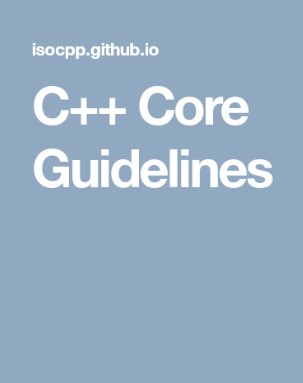
|
FreeComputerBooks.com
Links to Free Computer, Mathematics, Technical Books all over the World
|
|
- Title C++ Core Guidelines
- Author(s) Bjarne Stroustrup (editor), Herb Sutter (editor)
- Publisher: Standard C++ Foundation and GitHub
- License(s): MIT-style License
- Paperback N/A
- eBook HTML
- Language: English
- ISBN-10: N/A
- ISBN-13: N/A
- Share This:

|
The aim of the guidelines is to help people to use modern C++ effectively. By "modern C++" we mean C++11, C++14, and C++17. In other words, what would you like your code to look like in 5 years' time, given that you can start now? In 10 years' time?
The guidelines are focused on relatively higher-level issues, such as interfaces, resource management, memory management, and concurrency. Such rules affect application architecture and library design. Following the rules will lead to code that is statically type-safe, has no resource leaks, and catches many more programming logic errors than is common in code today. And it will run fast -- you can afford to do things right.
About the Authors- Bjarne Stroustrup is a Danish computer scientist, who is most notable for the creation and development of the C++ programming language.[5] He is a visiting professor at Columbia University, and works at Morgan Stanley as a Managing Director in New York.
- Herb Sutter is a prominent C++ expert. He is also a book author and was a columnist for Dr. Dobb's Journal. He joined Microsoft in 2002 as a platform evangelist for Visual C++ .NET, rising to lead software architect for C++/CLI.
 Similar Books:
Similar Books:
- Tips and Tricks of the C++ Professionals
- Fundamentals of Programming C++ (Richard L. Halterman)
- Modern C++ Programming Cookbook (Marius Bancila)
- The C++ Hackers Guide (Steve Oualline)
-
 Tips and Tricks of the C++ Professionals
Tips and Tricks of the C++ Professionals
This unique book features advanced programming tips available nowhere else! Experienced programmers will appreciate the coding workarounds, patch fixes, and inside secrets from a variety of sources, all intended to increase C++ productivity.
-
 Industrial Strength C++: Rules and Recommendations
Industrial Strength C++: Rules and Recommendations
This book presents proven strategies for using and programming in the C++ object-oriented language in the form of easy-to-follow lists of rules and recommendations. It covers naming conventions, code organization, resource management, etc.
-
 C++ in Action: Industrial Strength Programming Techniques
C++ in Action: Industrial Strength Programming Techniques
This is a modern guide to using C++ langugage, including how to apply it to Windows programming. Shows how to write programs for programmers, not computers. It teaches the programmer how to write small, fast, reliable, and scalable programs.
-
 Optimizing C++ (Steve Heller)
Optimizing C++ (Steve Heller)
This book offers several high-performance search and data-compression algorithms, which are all you need to add speed to C++. In some of the most useful sections of this book, the author looks at Huffman coding and dynamic hashing.
-
 Fundamentals of Programming C++ (Richard L. Halterman)
Fundamentals of Programming C++ (Richard L. Halterman)
This book teaches the basics of C++ programming in an easy-to-follow style, without assuming previous experience in any other language. It explains fundamental concepts and techniques in greater depth than traditional introductions.
-
 C++, A Dialog: Programming with the C++ Standard Library
C++, A Dialog: Programming with the C++ Standard Library
It teaches C++ from scratch, through a one-on-one conversation with an intelligent beginner who asks the questions you'd ask. It is the easiest, most effective way for beginners to learn C++ programming.
-
 The Rook's Guide to C++ (Jeremy A. Hansen)
The Rook's Guide to C++ (Jeremy A. Hansen)
This textbook written by Norwich University students and faculty aims to provide an introduction to the C++ programming language. This step-by-step book is ideal for first-time programmers or those new to C++.
-
 Thinking in C++, Vol 1: Introduction to Standard C++ (2nd Edition)
Thinking in C++, Vol 1: Introduction to Standard C++ (2nd Edition)
Thinking in C++ by Bruce Eckel is the one C++ book you must have if you're doing serious development with C++. The book filled with expert advice and written in a patient, knowledgeable style.
-
 Object-Oriented Programming in C++, 4th Edition (Robert Lafore)
Object-Oriented Programming in C++, 4th Edition (Robert Lafore)
This book begins with the basic principles of the C++ programming language and systematically introduces increasingly advanced topics while illustrating the OOP methodology. It reflects the latest ANSI C++ standard and current practices.
-
 O'Reilly® Practical C++ Programming, 2nd Edition (Steve Oualline)
O'Reilly® Practical C++ Programming, 2nd Edition (Steve Oualline)
This book is is a complete introduction to the C++ language for programmers who are learning C++. Reflecting the latest C++ standard, it takes a useful down-to-earth approach, placing a strong emphasis on how to design clean, elegant code.
-
 Programming Abstractions in C++ (Eric S. Roberts)
Programming Abstractions in C++ (Eric S. Roberts)
This book gives students opportunities to practice and learn with engaging graphical assignments. A client-first approach to data structures helps students absorb, and then apply the material.
-
 Data Parallel C++: Mastering DPC++ Programming
Data Parallel C++: Mastering DPC++ Programming
Learn how to accelerate C++ programs using Data Parallelism. This book enables C++ programmers to be at the forefront of this exciting and important new development that is helping to push computing to new levels.
-
 Data Structures and Algorithm Analysis in C++, 3rd Edition
Data Structures and Algorithm Analysis in C++, 3rd Edition
A comprehensive treatment focusing on the creation of efficient data structures and algorithms, using C++, this text explains how to select or design the data structure best suited to specific problems.
-
 O'Reilly® C++ Today: The Beast is Back (Jon Kalb, et al)
O'Reilly® C++ Today: The Beast is Back (Jon Kalb, et al)
Authors demonstrate how modern C++ provides the power, performance, libraries, and tools necessary for massive server farms as well as low-footprint mobile apps. you’ll learn why C++ is once again the preferred choice across several diverse industries.






